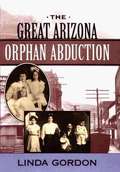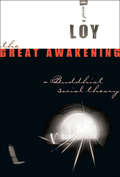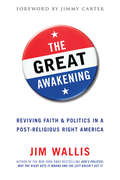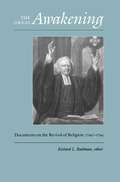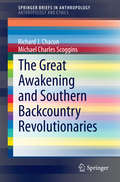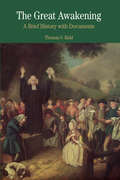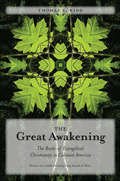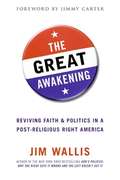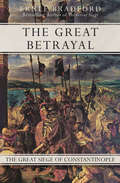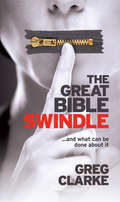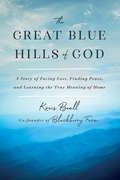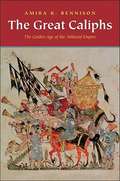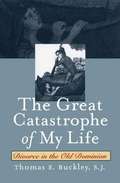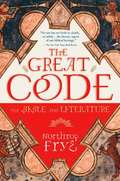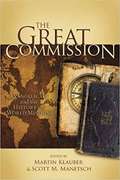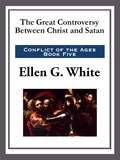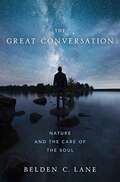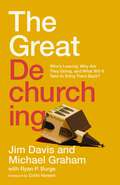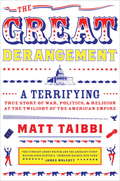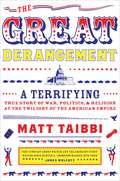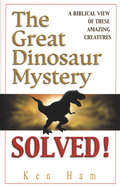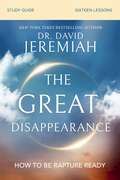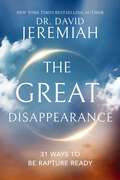- Table View
- List View
The Great Arizona Orphan Abduction
by Linda GordonThis text tells the disturbing history of racial boundaries along the USA/Mexican border. It focuses on the case of some Irish orphans who were placed with Mexican families, and the resulting anger of the town's Anglos who formed a vigilante squad to kidnap the children away from the Mexicans.
The Great Awakening
by David R. LoyThe most essential insight that Buddhism offers is that all our individual suffering arises from three and only three sources, known in Buddhism as the three poisons: greed, ill-will, and delusion. In The Great Awakening, scholar and Zen teacher David Loy examines how these three poisons, embodied in society's institutions, lie at the root of all social maladies as well. The teachings of Buddhism present a way that the individual can counteract these to alleviate personal suffering, and in the The Great Awakening Loy boldly examines how these teachings can be applied to institutions and even whole cultures for the alleviation of suffering on a collective level. This book will help both Buddhists and non-Buddhists to realize the social importance of Buddhist teachings, while providing a theoretical framework for socially engaged members of society to apply their spiritual principles to collective social issues. The Great Awakening shows how Buddhism can help our postmodern world develop liberative possibilities otherwise obscured by the anti-religious bias of so much contemporary social theory.
The Great Awakening
by Jim WallisNow in paperback: the bestselling author of God's Politics revives our hope in a politics that reflects our highest common values and offers a roadmap for solving our biggest social problems.
The Great Awakening
by Richard L. BushmanMost twentieth-century Americans fail to appreciate the power of Christian conversion that characterized the eighteenth-century revivals, especially the Great Awakening of the 1740s. The common disdain in this secular age for impassioned religious emotion and language is merely symptomatic of the shift in values that has shunted revivals to the sidelines.The very magnitude of the previous revivals is one indication of their importance. Between 1740 and 1745 literally thousands were converted. From New England to the southern colonies, people of all ages and all ranks of society underwent the New Birth. Virtually every New England congregation was touched. It is safe to say that most of the colonists in the 1740s, if not converted themselves, knew someone who was, or at least heard revival preaching.The Awakening was a critical event in the intellectual and ecclesiastical life of the colonies. The colonists' view of the world placed much importance on conversion. Particularly, Calvinist theology viewed the bestowal of divine grace as the most crucial occurrence in human life. Besides assuring admission to God's presence in the hereafter, divine grace prepared a person for a fullness of life on earth. In the 1740s the colonists, in overwhelming numbers, laid claim to the divine power which their theology offered them. Many experienced the moral transformatoin as promised. In the Awakening the clergy's pleas of half a century came to dramatic fulfillment.Not everyone agreed that God was working in the Awakening. Many believed preachers to be demagogues, stirring up animal spirits. The revival was looked on as an emotional orgy that needlessly disturbed the churches and frustrated the true work of God. But from 1740 to 1745 no other subject received more attention in books and pamphlets.Through the stirring rhetoric of the sermons, theological treatises, and correspondence presented in this collection, readers can vicariously participate in the ecstasy as well as in the rage generated by America's first national revival.
The Great Awakening and Southern Backcountry Revolutionaries
by Richard J. Chacon Michael Charles ScogginsThis work documents the impact that the Great Awakening had on the inhabitants of colonial America's Southern Backcountry. Special emphasis is placed on how this religious revival furrowed the ground on which the seeds of the American Revolution would sprout. The investigation shows how the Great Awakening can be traced to the Europe's Age of Enlightenment. This effort also demonstrates how and why this revival spread so rapidly throughout the colonies. Special focus is placed on how the Great Awakening impacted the mindset of colonists of the Southern Backcountry. Most significantly, this research demonstrates how this 18thcentury revival not only cultivated a sense of American national identity, but how it also fostered a colonial mindset against established authority which, in turn, facilitated the success of the American Revolution. Additionally, this investigation will document (from a cross-cultural perspective) how religious revivals have fueled other revolutionary movements around the world. Such analysis will include the Celtic Druid Revolt, the Maji-Maji Rebellion of East Africa along with the Mad Man's War in Southeast Asia. Lastly, the ethical ramifications of minimizing (or denying) the role that religion played in political and social transformations around the world will be addressed. This final point is of paramount importance given current trend in academia to minimize the role that religion played in spurring revolutions while emphasizing material (i. e. economic) causal factors. This attempt at divorcing religion from history is misguided and unethical because it is not only misleading but it also fails to fully acknowledge the beliefs and values that motivated individuals to take certain actions in the first place.
The Great Awakening: A Brief History With Documents (Bedford Series in History and Culture)
by Thomas S. KiddA detailed examination of the First Great Awakening, this volume presents a valuable study of the spiritual movement that profoundly shaped colonial American cultural and religious life. Thomas Kidd’s comprehensive introduction relies on recent scholarship to describe three contemporary views of the revivals: those of radicals in favor of them, moderates supporting them, and antirevivalists attacking them. The views and experiences of these participants and critics emerge through nearly 40 documents organized into topical sections. By expanding coverage of the radicals and the ordinary people, including women, African Americans, and Native Americans, who joined the revival movement, Kidd gives students an opportunity to hear a broader collection of voices from colonial American society. The volume also includes illustrations, headnotes to the documents, a chronology of the Great Awakening, a selected bibliography, questions to consider, and an index.
The Great Awakening: A Brief History with Documents
by Thomas S. KiddA detailed examination of the First Great Awakening, this volume presents a valuable study of the spiritual movement that profoundly shaped colonial American cultural and religious life. Thomas Kidd's comprehensive introduction relies on recent scholarship to describe three contemporary views of the revivals: those of radicals in favor of them, moderates supporting them, and antirevivalists attacking them. The views and experiences of these participants and critics emerge through nearly 40 documents organized into topical sections. By expanding coverage of the radicals and the ordinary people, including women, African Americans, and Native Americans, who joined the revival movement, Kidd gives students an opportunity to hear a broader collection of voices from colonial American society. The volume also includes illustrations, headnotes to the documents, a chronology of the Great Awakening, a selected bibliography, questions to consider, and an index.
The Great Awakening: Reviving Faith and Politics in a Post-Religious Right America
by Jim WallisWallis shows us that a revival is happening, as people of faith and moral conviction seek common ground for change, in a nation hungry for politics of solutions and hope.
The Great Betrayal: The Great Siege of Constantinople
by Ernle BradfordAn engrossing chronicle of the Fourth Crusade and the fall of the Holy Roman Empire, from the bestselling author of Thermopylae. At the dawn of the thirteenth century, Constantinople stood as the bastion of Christianity in Eastern Europe. The capital city of the Byzantine Empire, it was a center of art, culture, and commerce that had commanded trading routes between Asia, Russia, and Europe for hundreds of years. But in 1204, the city suffered a devastating attack that would spell the end of the Holy Roman Empire. The army of the Fourth Crusade had set out to reclaim Jerusalem, but under the sway of their Venetian patrons, the crusaders diverted from their path in order to lay siege to Constantinople. With longstanding tensions between the Roman Catholic and Eastern Orthodox churches, the crusaders set arms against their Christian neighbors, destroying a vital alliance between Eastern and Western Rome. In The Great Betrayal, historian Ernle Bradford brings to life this powerful tale of envy and greed, demonstrating the far-reaching consequences this siege would have across Europe for centuries to come.
The Great Bible Swindle: And What Can Be Done About It
by Greg ClarkeAll other books are also-rans...the Bible is publishing's success story. This introductory book is written especially for those who feel that they really should know something about the world's most influential text, but may have been afraid to ask, put off by the church, found the black leather cover and cigarette paper pages ominous, or just never got around to it.
The Great Blue Hills of God: A Story of Facing Loss, Finding Peace, and Learning the True Meaning of Home
by Kreis BeallThe creative force behind Blackberry Farm, Tennessee&’s award-winning farm-to-table resort, reveals how she found herself only after losing everything in this powerful memoir of resilience. &“I couldn&’t put down this wise, honest, beautifully written story.&”—Shauna Niequist, New York Times bestselling author of Present Over Perfect and Bread & WineBorn with the gift of hospitality, Kreis Beall helped create one of the nation&’s most renowned resort destinations, Blackberry Farm, in Tennessee&’s Smoky Mountain foothills. For decades, she was a fixture in the travel and entertaining world and frequently appeared in the pages of popular home and design magazines. But at the pinnacle of her success, Kreis faced a series of challenges that reframed her life, including a brain injury that permanently impaired her hearing and the conclusion of her thirty-six-year marriage to her best friend and business partner, Sandy Beall. Alone and uncertain as her world shifts and marriage ends, Kreis begins a new journey to find her faith and find God. After spending years on her beautiful exterior life and work, she begins the hardest undertaking of all: reclaiming and redesigning her interior life and soul. Kreis retreats to Blackberry Farm, moving into an unassuming, 300-square-foot shed with peeling paint on the exterior walls, &“where I met myself for the first time.&” She examines what it takes to redefine life after deep loss and acknowledges, for the first time, often unbearable truths that existed beneath the beauty she had created. By turns fiercely honest, heartbreaking, and warm, Kreis Beall&’s story will resonate with anyone who can benefit from her discovery that &“All it takes is all you&’ve got. And it is worth it.&”
The Great Caliphs: The Golden Age Of The 'abbasid Empire
by Amira K. BennisonIn this accessibly written history, Amira K. Bennison contradicts the common assumption that Islam somehow interrupted the smooth flow of Western civilization from its Graeco-Roman origins to its more recent European and American manifestations. Instead, she places Islamic civilization in the longer trajectory of Mediterranean civilizations and sees the 'Abbasid Empire (750-1258 CE) as the inheritor and interpreter of Graeco-Roman traditions. At its zenith the 'Abbasid caliphate stretched over the entire Middle East and part of North Africa, and influenced Islamic regimes as far west as Spain. Bennison's examination of the politics, society, and culture of the 'Abbasid period presents a picture of a society that nurtured many of the "civilized" values that Western civilization claims to represent, albeit in different premodern forms: from urban planning and international trade networks to religious pluralism and academic research. Bennison's argument counters the common Western view of Muslim culture as alien and offers a new perspective on the relationship between Western and Islamic cultures.
The Great Catastrophe of My Life
by Thomas E. BuckleyFrom the end of the Revolution until 1851, the Virginia legislature granted most divorces in the state. It granted divorces rarely, however, turning down two-thirds of those who petitioned for them. Men and women who sought release from unhappy marriages faced a harsh legal system buttressed by the political, religious, and communal cultures of southern life. Through the lens of this hostile environment, Thomas Buckley explores with sympathy the lives and legal struggles of those who challenged it.Based on research in almost 500 divorce files, The Great Catastrophe of My Life involves a wide cross-section of Virginians. Their stories expose southern attitudes and practices involving a spectrum of issues from marriage and family life to gender relations, interracial sex, adultery, desertion, and domestic violence. Although the oppressive legal regime these husbands and wives battled has passed away, the emotions behind their efforts to dissolve the bonds of marriage still resonate strongly.
The Great Code: The Bible And Literature
by Northrop FryeAn examination of the influence of the Bible on Western art and literature and on the Western creative imagination in general. Frye persuasively presents the Bible as a unique text distinct from all other epics and sacred writings.
The Great Commission: Evangelicals And The History Of World Missions
by D. A. Carson Randall Balmer Timothy George Erwin Lutzer Scott M. Manetsch Martin Klauber Tom Nettles Daniel Salinas Glenn Sunshine Jon Hinkson Brad GundlachThe Great Commission provides a substantial historical survey of evangelical missions courtesy of eleven different authors, each one a prominent evangelical church historian and theologian who has written extensively on the history of Christianity and the greater mission of the church. Readers will learn the origins and development of modern evangelical missionary activity, what led to the globalization of the Evangelical movement, and the finer points of the movement’s successes, failures, and future imperatives. Sections include Early Modern Europe (“The Protestant Reformation,” “Puritanism and Pietism,” “The Evangelical Revival”), Modern America (“Early American Missions,” “Twentieth Century American Missions,” “The Baptist Contribution”), and The Majority Church (“Latin America,” “Asia,” “Africa”).
The Great Compromise
by Greg LauriePastor Laurie shows how seemingly small compromises can weaken and eventually bring down Christians over time. He encourages readers to draw closer to God and ask Him to search their hearts for areas where compromise with sin has gained a foothold.
The Great Controversy
by Ellen G. WhiteAs outspoken in his day as Richard Dawkins or Christopher Hitchens are today, American freethinker and author ROBERT GREEN INGERSOLL (1833-1899) was a notorious radical whose uncompromising views on religion and slavery (they were bad, in his opinion), women's suffrage (a good idea, he believed), and other contentious matters of his era made him a wildly popular orator and critic of 19th-century American culture and public life. As a speaker dedicated to expanding intellectual horizons and celebrating the value of skepticism, Ingersoll spoke frequently on such topics as atheism, freedom from the pressures of conformity, and the lives of philosophers who espoused such concepts. This collection of his most famous speeches includes the lectures: [ "The Gods" (1872) [ "Humboldt" (1869) [ "Thomas Paine" (1870) [ "Individuality" (1873) [ "Heretics and Heresies" (1874)
The Great Controversy Between Christ and Satan
by Ellen G. WhiteVolume 5 of the 'Conflict of the Ages' book series, 'The Great Controversy,' covers the 70 A.D. destruction of Jerusalem, through Church History, to the end of sin and the recreation of the earth. This key Seventh Day Adventist text explains in detail the SDA understanding of the conflict between God and Satan and their understanding of the Bible and much of world history. White wrote the series based on her research of other authors and special information which she claimed to receive through visions from God. The books thus include unique insights and concepts not found in other works of the time.
The Great Conversation: Nature And The Care Of The Soul
by Belden C. Lane"We are surrounded by a world that talks, but we don't listen. We are part of a community engaged in a vast conversation, but we deny our role in it." In the face of climate change, species loss, and vast environmental destruction, the ability to stand in the flow of the great conversation of all creatures and the earth can feel utterly lost to the human race. But Belden C. Lane suggests that it can and must be recovered, not only for the sake of endangered species and the well-being of at-risk communities, but for the survival of the world itself. The Great Conversation is Lane's multi-faceted treatise on a spiritually centered environmentalism. At the core is a belief in the power of the natural world to act as teacher. In a series of personal anecdotes, Lane pairs his own experiences in the wild with the writings of saints and sages from a wide range of religious traditions. A night in a Missourian cave brings to mind the Spiritual Exercises of Ignatius of Loyola; the canyons of southern Utah elicit a response from the Chinese philosopher Laozi; 500,000 migrating sandhill cranes rest in Nebraska and evoke the Sufi poet Farid ud-Din Attar. With each chapter, the humility of spiritual masters through the ages melds with the author's encounters with natural teachers to offer guidance for entering once more into a conversation with the world.
The Great Dechurching: Who’s Leaving, Why Are They Going, and What Will It Take to Bring Them Back?
by Jim Davis Michael Graham Ryan P. BurgeWe are currently experiencing the largest and fastest religious shift in US history.It is greater than the First and Second Great Awakening and every revival in our country combined...but in the opposite direction. Yet precious little rigorous study has been done on the broad phenomenon of dechurching in America. Jim Davis and Michael Graham have commissioned the largest and most comprehensive study of dechurching in America by renowned sociologists Dr. Ryan Burge and Dr. Paul Djupe.The Great Dechurching takes the insights gleaned from this study to drill down on how exactly people are dechurching with respect to beliefs, behavior, and belonging.This book gives the church in America its first ever deep dive into the dechurched phenomenon. You'll learn about the dechurched through a detailed sketch of demographics, size, core concerns, church off-ramps, historical roots, and the gravity of what is at stake. Then you'll explore what can be done to slow the bleed, engage the pertinent issues winsomely and wisely, and hopefully re-church some of the dechurched.
The Great Derangement: A Terrifying True Story of War, Politics, and Religion
by Matt TaibbiFunny, smart, and a little bit heartbreaking, "The Great Derangement" is an audaciously reported, sobering, and illuminating portrait of America at the end of the Bush era.
The Great Derangement: A Terrifying, True Story of War, Politics, and Religion at the Twilight of the American Empire
by Matt TaibbiIn describing the post-9/11 era, Taibbi ended up vomiting demons in an evangelical church in Texas, riding the streets of Baghdad in a convoy to nowhere, following a pork trail through Congress, and falling into the rabbit hole of the 9/11 Truth Movement. He tells the story of this new American madness by inserting himself into four defining American subcultures: THE MILITARY, THE SYSTEM, THE RESISTANCE, and THE CHURCH. Together these four interwoven adventures paint a portrait of a nation dangerously our of touch with reality and manically searching for answers in all the wrong places.
The Great Dinosaur Mystery Solved: A Biblical View of These Amazing Creatures
by Ken HamA dinosaur book like you've never seen before! Not only is the "dinosaur mystery" solved, but you'll be taught the TRUE history of the earth and its inhabitants! Your thinking about this world will never be the same again! A wealth of information combined into one volume, this fascinating book is a perfect addition to your family library!
The Great Disappearance Bible Study Guide: How to Be Rapture Ready
by Dr. David JeremiahIt Will Be an Ordinary Day— Until, Suddenly, It Isn&’tFor decades, Dr. David Jeremiah has searched the Scriptures for answers regarding the future monumental events known as the Rapture, the Tribulation, the Second Coming, and more. The Great Disappearance compiles his prophetic research for curious believers who patiently await the triumphant return of Christ. This study guide reinforces Dr. Jeremiah&’s dynamic, in-depth teaching to aid you in applying biblical truth to your daily life.Drawing from his deep knowledge of biblical prophecy and passion for sharing the truth of God&’s Word, Dr. Jeremiah skillfully unravels the mysteries surrounding the Rapture and the Second Coming. Designed for use with Dr. Jeremiah&’s book, The Great Disappearance Study Guide dives into the promises of Jesus&’ return in the Old and New Testaments. Whether you are a seasoned student of prophecy or new to the faith, this guide will expand your understanding, deepen your faith, and bring you one step closer to the future glory awaiting those who put their faith in Christ Jesus.Each lesson includes:An outline of the main subjects and Scriptures covered during the lessonAn overview of Dr. Jeremiah&’s teaching on the topic being studiedApplication questions to help both individuals and small groups delve into the content and the BibleA Did You Know? section that adds a point of interest to the lesson
The Great Disappearance: 31 Ways to be Rapture Ready
by Dr. David JeremiahThe rapture is the central event in biblical prophecy. But what does it mean for us today? How can this crucial end times event draw us nearer to God in a world that is seemingly on the brink of chaos? Political turmoil, economic uncertainty, an ideological divide that feels increasingly impassable—the signs of the times point us toward the end, and that can be disconcerting.But the greatest truth about the rapture is not its timing, but its reality—for blessed are all who long for His appearing.The Great Disappearance is a culmination of decades of Dr. Jeremiah studying end times throughout the Bible. In this definitive volume he will explain the meaning of the word rapture, the difference between the rapture and the second coming, and the joy of expecting our Savior to come at any given moment. Dr. Jeremiah will also explore key questions such as:Who will be raptured?When will it happen?What will happen to those left behind?What will believers experience when they are taken away to heaven?Will non-believers still have time to repent and be saved? Dr. Jeremiah seeks to answer all of those questions and many more, not with sensationalism or stories ripped from the headlines but with solid, biblical truth. Because God has laid out His plan for us in His Word so that we might not be caught unaware. We may not know the exact date that the rapture will happen, but we do know it will happen. Are you ready for it?
